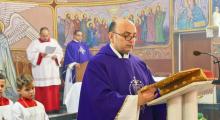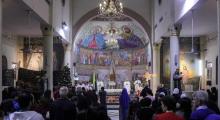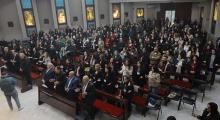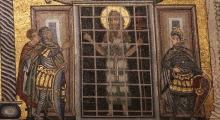Issued by the Catholic Center for Studies and Media - Jordan. Editor-in-chief Fr. Rif'at Bader - موقع أبونا abouna.org
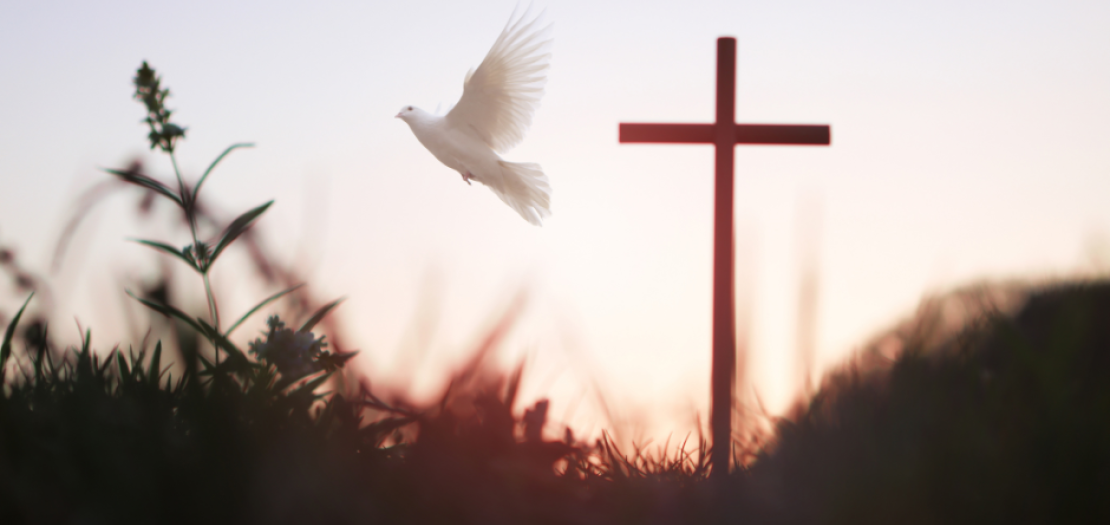
In Jerusalem, the Week of Prayer for Christian Unity was held this year from 25 January to 2 February. As according to tradition, the Week opens on the Saturday following the Armenian Christmas (19 January), and as per tradition, it opens with the participation in the Office of the Apodeipnon of the Greek Orthodox at the Calvary (Basilica of the Holy Sepulcher).
In the name of Nicaea
This year, the topic suggested by the Jerusalem Inter-Church Committee (JICC) was “Do you believe this?” (John 11, 26). This year marks the 1700th anniversary of the Council of Nicaea, the first Christian ecumenical council, held in 325.
The Fathers of Nicaea made every effort to find words that embraced the mystery of the incarnation and of the passion, death and resurrection of the Lord. The recital of the “Credo” according to the recital of the “Credo” according to the wording that emerged from that assembly, was at the center of every celebration.
The richness of denominations present in Jerusalem also allowed a genuine peregrination of the whole of the Christian people, who every day were able to enjoy different expression – artistic, liturgical or linguistic – of the only Christian faith and draw on its common heritage.
Exchange of gifts
The initiatives in this Week included the exchange of preachers between the preachers of the Latin Catholic Church and of the Anglican Church. On Sunday 26 January, the auxiliary bishop of the Latin Patriarchate, William Shomali, delivered the sermon in the Anglican Cathedral of St George.
Three days later, the Anglican archbishop Hosam Naoum did the same in the church of the Latin Patriarchate, the co-cathedral of Jerusalem. “This is a positive step, which corresponds to the increased relations between the Churches in Jerusalem,” according to the archbishop Naoum.
The meaning and the spirit of this initiative were explained by Mons. Shomali: “This exchange is possible as we share almost everything: we have the same Bible, the same Baptism, the same faith in a God who is one and three, the same doctrine expressed in the Nicene-Constantinopolitan Credo, and we belong, despite our divisions, to the only Church founded by Jesus Christ, which is one, holy, Catholic and Apostolic.”
True peace
The Week of Prayer took place this year while a truce is under way in the war in Gaza. It is a moment of relief, but not yet true peace. This is why, every day, the ecumenical prayer has also always been a prayer to ask God for the gift of peace.
“Peace is not the absence of conflict, but the presence of God in our hearts,” said Father Aghan Gogchyan, chancellor of the Armenian Patriarchate, in his sermon in St James’ Cathedral. “Peace starts in the soul and only afterwards does it extend outside and touch our relations. Peace starts in our heart, if God inhabits it. If we want to be instruments of peace in this world, first of all, we have to let peace inhabit us, in our wounds, in our worries and in our fears.”
Unity is not an ecumenical “ceasefire”
From the Cenacle, where according to tradition the Last Supper of Jesus with the Apostles took place, as well as the first Council, the Council of the Apostles, there comes the most vibrant call for unity. It was by Father Nikodemus Schnabel, the Benedictine abbot of the Dormition, just a few steps away.
“At times, on our ecumenical path, what we call unity is more an ecumenical truce. We agree in not saying that the others are heretics and schismatic and are not really Christians, we greet each other and try to be friendly. But this is not what we are praying for today. The unity of all baptized Christians is more than an ecumenical truce. Let us open our hearts, so that our ecumenical relationship, especially in Jerusalem, is not only an ecumenical truce, but real ecumenical peace.”
A date for Easter
Father Nikodemus Schnabel also made a suggestion to overcome the dispute over the date of Easter, which this year, by a happy coincidence, falls on the same day for everyone.
The Nicene Fathers decided to celebrate Easter on the Sunday after the first full moon in Spring and after the Jewish Passover (which is also a movable feast). The problem arose when the Gregorian calendar was adopted in the West, more correct from the astronomic point of view, while the Oriental Church kept the Julian calendar.
The Benedictine abbot suggested considering the second aspect of the formulation of Nicaea and celebrating Easter on a single date “on the Sunday after Passover,” without one tradition prevailing over another but in a sort of return to the origins.”


